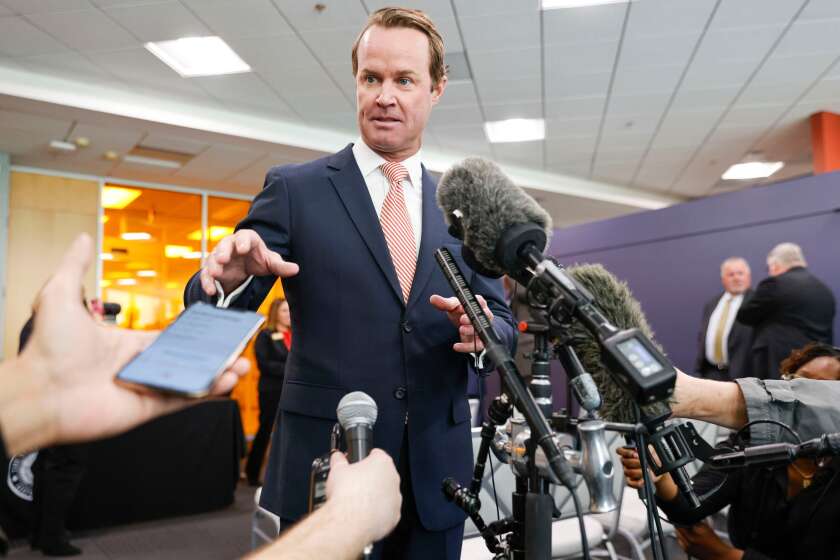The Political Future of Fani Willis
Her prosecution of Trump has drawn controversy and legal challenges, but it hasn’t hurt her at home. The speaker of the Texas House, however, faces serious challenges to his leadership.
Alan Greenblatt
30/05/2024
Editor’s Note: This article is a part of Governing ‘s Inside Politics newsletter. Sign up here .

The political future of Fani Willis The verdict: An New York jury found former President Donald Trump guilty on all allegations in the “hush money” and business records case on Thursday. The verdict was significant and also demonstrates by something that hasn’t occurred in any other cases that involve Trump: Holding and completing the trial.
Other charges against Trump are related to the election interference indictment he was charged with and numerous suspects from Fulton County, Ga. in the year 2000. Some of them have pleaded guilty immediately however the case is put on hold while an appellate court in the state prepares to hear complaints regarding professional misconduct in the case of Fani Willis District Attorney of the county who was in an romance to a Special Counsel in this case.
This could delay this trial till after elections. While the judge permitted it to proceed, he determined that there was an “significant appearance of impropriety.” Conservative media slammed Willis for her relationship and the couple’s travels outside of state. She was targeted numerous times and in April, an unnamed California man was convicted by an federal grand jury after he sent the death threat to her. Willis was also criticized by her handling massive Racketeer corrupt Organisation (RICO) trials and one of them involved hip-hop artist Young Thug which is the longest state trial in history.
All of this doesn’t seem to have worried Fulton County voters. Willis received nearly 87 percent of the votes in the last week’s Democratic primary. “In terms of how people feel about her, the cross-section of the votes she received — well into the 80th percentile — really tells the story,” said the former Atlanta City Manager Shirley Franklin.
She is a Republican candidate has been Courtney Kramer, who served as an intern in the Trump White House and can be assured of keeping up the rumblings of complaints about Willis. However, Kramer has only spent for a couple of months as an attorney, and does not have experience in trial for criminals. Other than the most prominent cases, Willis will be able to build on a record decline in the number of homicides as well as other violent crimes in Atlanta this year, following the city experienced in common with other large cities, an swine flu-like rise.
“Fani Willis has always been a strong campaigner, and the way that prominent Georgia Democrats rallied around her in her primary re-election strongly suggests that she won’t have much trouble in her November re-election,” says Howard Franklin, a lobbyist and consultant in Atlanta (and not related to former Mayor). “I also expect she’ll have a larger group of donors and the political war chest to tell voters about her less-heralded but equally important efforts to keep Fulton County safe.”
Fulton County was central to the triumphs of President Joe Biden and the state’s two Democratic U.S. senators. It’s quite unusual, in actual that an incumbent Republican to even consider seeking the position of District Attorney in this county. There was no one who was a candidate been in office for longer than half a century. “It would be unusual for her, a credible candidate with her record and her experience, not to win,” Shirley Franklin. Shirley Franklin.
When the Trump indictments came down in the last year there was plenty of media speculation on the way that local voting patterns could impact juror pools. It was discovered at the very least, within Fulton County, that the local partisan bias also played a role to the prosecutor.

Do you think Dade Phelan Really Need Democrats?: On Tuesday, Texas House Speaker Dade Phelan narrowly won an election runoff. He was third on the ballot in the Republican primary race against the former Orange County GOP Chair David Covey however, he was able to prevail in the runoff with 366 votes due in large part, to almost $4 million of spending by businesses.
Phelan had a major opponent on his back due to several reasons. In the state, the House impeached the state Attorney General Ken Paxton, but after the state Senate was unable to find him guilty, Paxton led a vendetta against Phelan as well as a plethora of other House Republicans who were not in support of his. The House was also unable to pass the school voucher bill, which was supported by Governor. Greg Abbott. Even though Abbott did not support his Phelan campaign, he committed millions of dollars to removing others GOP incumbents.
Phelan was able to lose more than one dozen supporters in the primary elections, including six who were able to make it through the runoffs on Tuesday. Phelan now faces a major contest for his leadership position and one of the committee chairs currently in the race against him. Lt. Gov. Dan Patrick, a Phelan opponent, said he will not return to the speaker position. “To those considering supporting Dade Phelan as speaker in 2025, ask your 15 colleagues who lost re-election how they feel about their decision now,” Paxton stated in an announcement. “You will not return if you vote for Dade Phelan again.”
Covey claimed that Phelan only won the runoff after convincing Democrats to vote in support of his campaign. (Phelan “has blatantly stolen an election,” Paxton declared.) The more conservative Republicans are claiming that he’ll keep his position as speaker if he can persuade House Democrats to back the speaker, thereby proving the claim that he’s an RINO or a Republican just in name.

When Nobody Runs Friday is the last day for candidates to apply for state office in Alaska. In the majority of instances seats, there is no contest. Over one third from the legislators in the state House have no challenge in their upcoming term.
Alaska isn’t unusual. The majority of people in Oklahoma will not have a option to vote for state House elections, too. Five hundred out of 101 lawmakers were reelected through filing, and there was no one to oppose them. A majority members will get decided by the next round of primaries, which means the voters who voted who voted in two-thirds of the state House elections will not have a option in November. Similar to states with 26 Senate races. “Nationwide, over one-third of state legislative incumbents face neither a primary nor general election challenger,” states Steven Rogers, a political scientist at St. Louis University who has written about the the absence of competition for legislative seats. “These incumbents win re-election by just signing up for the job.”
Since a long time the majority of legislatures haven’t been competitive, with a strong preference for one side over the other. In the present, however the legislatures themselves aren’t competitive and the turnover of chambers has been of the low single digits over the last few sessions. This is a major reason why there are no incentives for potential candidates to consider to run, or for political parties to put their resources into the causes that appear to be losing.
in 2022 the control by partisans of all the 22 chambers was determined before any votes were taken because there was no concurrence, and the GOP assured veto-proof majorities in 13 chambers due to the fact that so only a few Democrats were interested in running. “It’s critical for Democrats to run everywhere, even in non-competitive districts,” says Gaby Goldstein co-founder of the Sister District Project, which is a supporter of Democratic legislators. “Democrats have to take a much longer view and commit to candidates, districts, regions and states that might not be competitive but will be later, if we start investing now.”
This is happening at the state of Missouri, Rogers notes. Two years ago, one out of 163 districts featured at least Democratic as well as Republican candidates, ensuring the survival in GOP supermajorities. The year is now a different story. Democrats are able to successfully recruit candidates challenge Republicans in the 114 districts that give at least a chance of breaking supermajorities.
It’s evident, after all, that political parties won’t succeed when they don’t have a single person in the voting. “Competition is important to give voters choices, and for a healthy democracy,” Rogers states. “If an incumbent runs uncontested, they may be more willing to vote in favor of special interests, instead of their constituents.”









